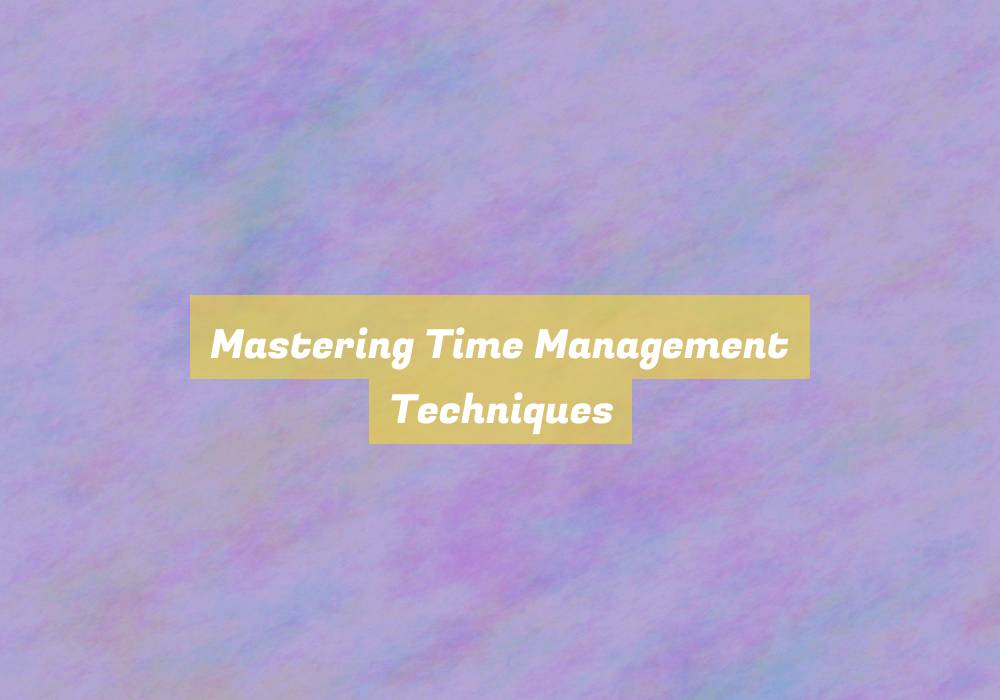Mastering Time Management Techniques
Feeling like youG??re constantly chasing your tail, trying to catch up with the demands of the day?
ItG??s time to take control and make the most of your hours.
Mastering time management techniques can be the key to unlocking a more efficient and organized life.
Whether youG??re a student, a professional, or a busy parent, the ability to manage your time effectively can lead to reduced stress and increased productivity.
But where do you start?
Setting Clear Goals
Setting clear and specific goals is essential for effective time management. When you have a clear understanding of what you want to achieve, it becomes easier to prioritize your tasks and allocate your time accordingly. Start by setting specific objectives for the day, week, or month. This could include completing a project, meeting a deadline, or reaching a personal milestone. Clearly define what success looks like for each goal, and break them down into smaller, manageable tasks. By doing so, you can track your progress and stay motivated as you accomplish each step.
Setting clear goals also helps you stay focused and avoid getting sidetracked by less important tasks. When you know exactly what you need to accomplish, it becomes easier to say no to distractions and time-wasting activities. This allows you to direct your energy towards tasks that align with your objectives, ultimately leading to increased productivity and a greater sense of achievement.
Prioritizing Tasks
To effectively manage your time, begin by prioritizing tasks based on their importance and urgency. This allows you to focus on what truly matters and ensures that you allocate your time and energy efficiently.
Start by identifying tasks that are both important and urgent. These are your top priority and should be tackled first.
Next, consider tasks that are important but not urgent. These are important for long-term goals and should be scheduled accordingly.
Then, address tasks that are urgent but not important. Delegate these if possible, as they may consume time without adding significant value.
Finally, tasks that are neither important nor urgent should be minimized or eliminated to free up more time for higher priority activities.
Eliminating Time Wasters
Start by identifying and eliminating time wasters that may be hindering your ability to focus on important and urgent tasks.
One common time waster is multitasking. While it may seem like youG??re being productive, multitasking actually divides your attention, leading to decreased efficiency and lower quality work.
Another time waster to watch out for is excessive social media use. ItG??s easy to get sucked into the endless scroll, so consider setting specific times for checking social media to avoid it interfering with your workflow.
Procrastination is another major time waster. Identify the root causes of your procrastination and work on addressing them to increase your productivity.
Additionally, poorly structured or unnecessary meetings can be a significant drain on your time. Evaluate the necessity and effectiveness of each meeting you attend or organize.
Finally, disorganization can lead to wasted time searching for misplaced items or information. Take the time to declutter and organize your workspace to avoid this time-wasting pitfall.
Implementing Effective Scheduling
Consider creating a detailed schedule that allocates specific time slots for your tasks and activities to enhance your productivity and time management. By doing so, you can effectively prioritize your responsibilities and ensure that each one receives the attention it deserves. Start by listing all your daily, weekly, and monthly tasks, then allocate realistic timeframes for each. Be sure to include buffer time to account for unexpected delays or additional tasks. Utilize scheduling tools such as digital calendars, planners, or time management apps to help you stay organized and on track.
When scheduling your tasks, consider your energy levels throughout the day and allocate more demanding or challenging tasks during times when youG??re most alert and focused. Additionally, group similar tasks together to minimize context switching and maximize efficiency. Remember to also schedule short breaks to rest and recharge, as this can help maintain your productivity levels throughout the day.
Lastly, ensure that you regularly review and adjust your schedule as needed to accommodate any changes or new priorities that may arise. Implementing effective scheduling techniques can significantly improve your time management and overall productivity.
Conclusion
Now that youG??ve learned about mastering time management techniques, itG??s time to put them into practice.
Set clear goals, prioritize tasks, eliminate time wasters, and implement effective scheduling to make the most of your time.
Remember, itG??s all about finding the right balance and making the most of every minute.
Keep practicing and refining these techniques to become a true master of time management.
Good luck!







